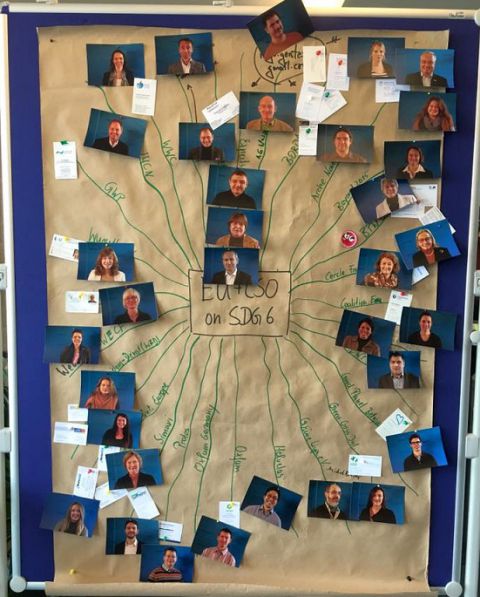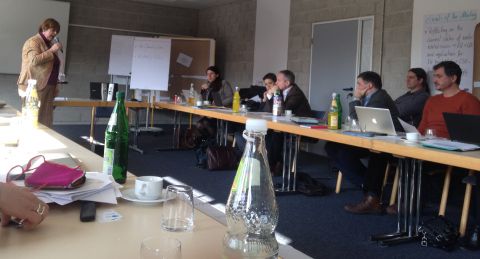Blog post written by Libby Smith, Advocacy Officer at WaterAid on 10 March 2016, following the recent civil society gathering entitled European “SDG 6 NGO/CSO Meeting”, in Germany.
This month, civil society actors from across Europe met in Bremen, Germany to discuss how we can better work together to help tackle the water, sanitation and hygiene (WASH) crisis and the crucial role that Europe must play as one of the world’s leading development actors.
Following an exceptional year of advocacy in the WASH sector, particularly with the achievement of a global goal on water and sanitation – Goal 6 – it is crucial that we keep up the pressure of our campaigning! We have to ensure that all our governments keep to their promises and meet their commitments to building a world where everyone, everywhere has access to water and sanitation by 2030. This is why this meeting came at an critical time, as all stakeholders are beginning discussions on national level implementation plans for the new global sustainable development agenda.
The meeting was organised by BORDA and the Women for Water Partnership and brought together a good range of civil society actors, from large development bodies, such as Oxfam and ourselves at WaterAid, to a range of smaller WASH service providers from around the region. Participants included many End Water Poverty members, and with this range of experience and expertise in the room, the day was a great opportunity for information sharing and discussing joint action, and meeting other members.

Participants discussed a wide range of topics, with conversation framed around four key issue areas. These were:
1. The EU Water Initiative and the UNECE protocol on water and health: This looked at the future of the European Commission’s main platform for promoting the Millennium Development Goals (MDGs) targets on water and sanitation (the EU Water Initiative) and UNECE’s Pan-European protocol promoting the attainment of water and sanitation for all.
2. The Human Rights framework and the European Citizen Initiative on the Right2Water: Discussion centred around how best to proceed in getting the human right to water and sanitation on the European agenda and how to utilise the European Citizens Initiative on the Right2Water.
3. The Global Water Architecture and upcoming high level advocacy opportunities: There is currently no mechanism or high level architecture in place to further SDG 6 at a global level. How can we as civil society work together to change this?
4. Water and Climate and the #ClimateIsWater Campaign: Learnings from the successful #ClimateIsWater Campaign carried out ahead of COP 21.

Participants discussing issues at the workshop
At WaterAid, we were especially interested in hearing more about the potential future of the EU Water Initiative which is currently up for review. The EU Water Initiative is a platform established by the European Commission in 2002 to promote the MDGs targets on water and sanitation. With the MDGs having come to an end in 2015, the future of this Initiative is still unknown. However, civil society will be able to input into these discussions through the Initiative’s CSO representatives, who were there on the day providing valuable insights into the process and opportunities to feed in.
Another useful takeaway from the day for EWP members is the list of crucial advocacy opportunities that we identified for 2016. These included:
- The European Water Initiative meeting in May
- The High Level Political Forum in July, of which deadlines for input will be towards the end of May
- The Moroccan Summit in July
- Stockholm World Water Week in August/ September
- The Budapest Summit in November
While those in attendance discussed their plans, it would be useful to know whether other members of EWP, who were unfortunately unable to attend, have plans centred around these key dates. Share these plans with us!
Overall, the day was a stark reminder of how crucial it is that we, as civil society, work together to ensure a coherent, concise voice when influencing stakeholders. Without this, we will be merely disjointed strands providing mixed and confusing messages that can be easily ignored. We all want the same thing – access to WASH for everyone, everywhere by 2030 – however we cannot achieve this alone. We must harness our collective strength if we are to be successful.
I left the meeting feeling hopeful that together we can accelerate progress toward total coverage of WASH. We have a complex year ahead with lots of opportunities and challenges, however through collaboration and forward planning we can achieve another exceptional year to match 2015! This is why we are celebrating Water Action Month running throughout the month of March. Now is the time for a united call for change. Together we can!